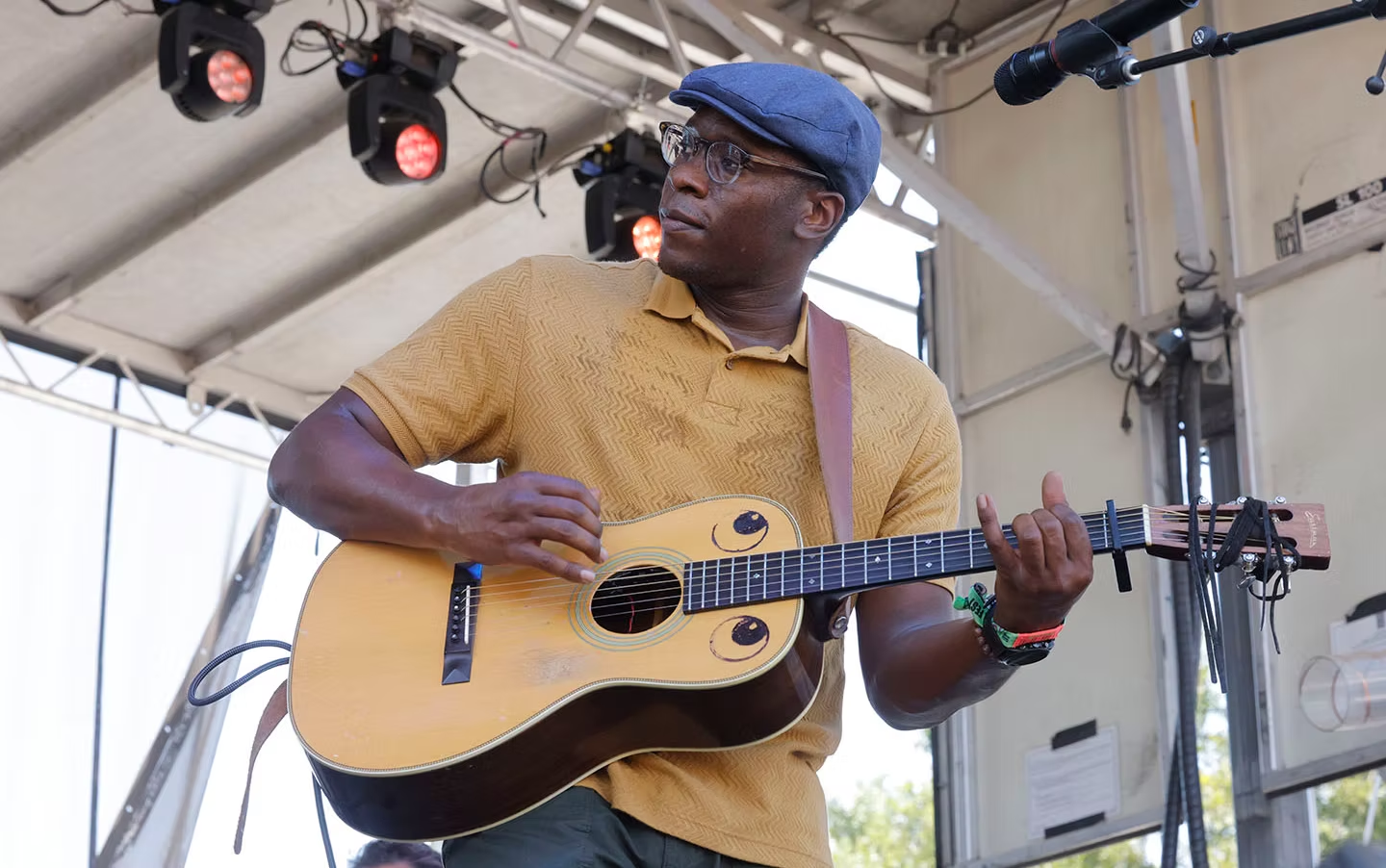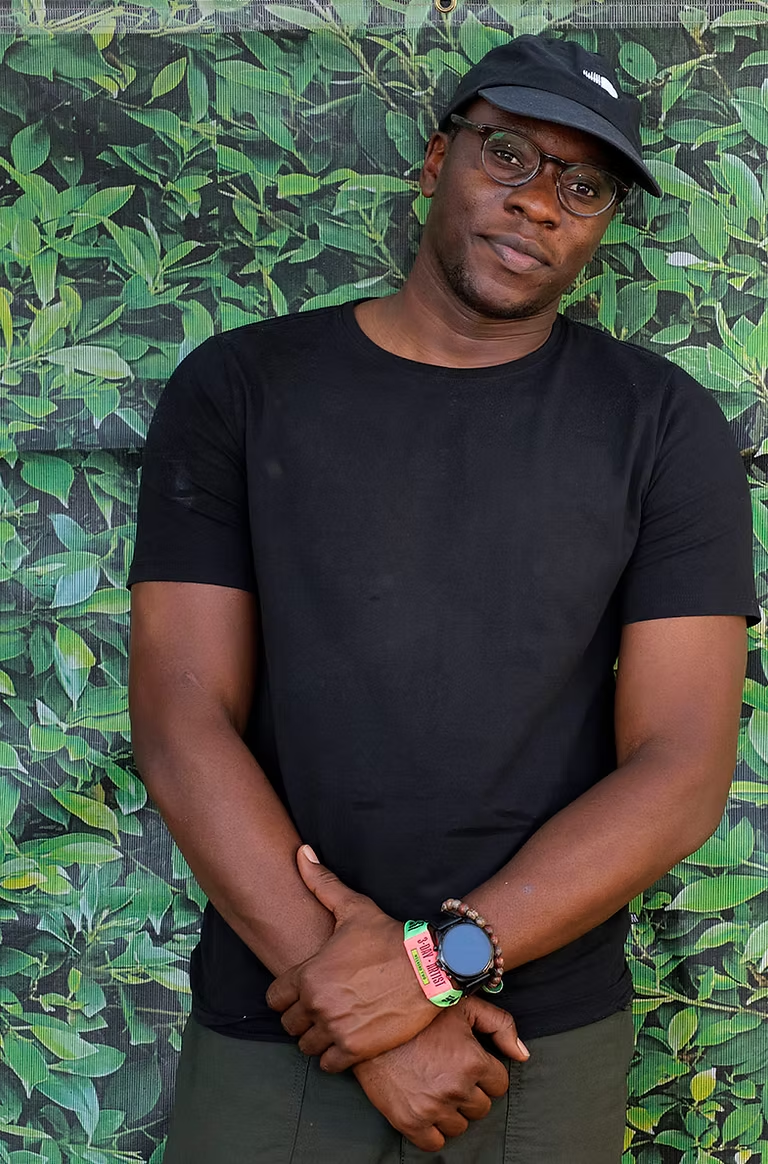
Story and Photos by: Cory Weaver
We caught up with Ugandan-born Jon Muq after his set on the BMI stage at Austin City Limits Music Festival. We discussed his album, Flying Away, emphasizing its unique, unstructured nature, with songs recorded in one take and without modern studio tricks. The Easy Eye Records artist has had quite the journey from Uganda to Austin.
Bands Through Town: So your album, to me, it’s like a good mixtape with a nice, steady flow. One thing that I noticed is that there’s an impression that you don’t follow anybody’s rules; you do your own thing. Has that become one of your mantras?
Jon Muq: Yeah, I didn’t grow up in a structured environment, and I always felt comfortable in my own structure. It’s only when I heard of a journal when I moved here and I was like, What’s a journal? And they started explaining, [but] still, my brain was like, but why do you have to have a journal if you are just anything that has no name? And that’s the same idea and mindset we put to the album, to be like something that is just itself. You know, it’s not too much breaking the rules, but at the same time, it’s not on timing. It’s not on anything. We didn’t use clicks or anything, and each song was one take. And actually, when you hear like a siren playing in a song, one of the songs on the album, it was a police siren passing by when we are recording. But we were like, you know, everything stays the way it is.
We were in the same room, and each song was one take—16 songs, four days and we got it. Throughout [the recording process] it was really beautiful, because we were all from different parts. Some of those people had never met each other before, so we were all new to each other. And it’s just so beautiful how human beings, no matter what, we can create something.
BTT: Could you talk a bit about your process when you’re writing a song like, let’s say, “Butterflies?”
JM: There are many stories behind such songs. For that specific song, it was two moments. Once, I went and met people I was living with, and we ended up in a bar [where] girls have fries and bikinis. And to me, that was so new. I was like, ‘Wow, I like this, actually.’ And then the girl asks me, ‘What kind of dressing do you want?’ And in my brain, I thought she’s asking me if she looks OK, because I’d never heard the word dressing in a food setting before. And I kept on looking at her up and down, and she thought I was weird. Then, I ended up talking with friends another time and they told me. But then, I was just like, ‘Damn, I’m gonna eat here every day.’
BTT: So, we go from ‘Butterflies’ to ‘Riding’—it’s a whole different style of writing, lyrically, it’s just a beautiful song.
JM: Yeah, there’s a story behind ‘Riding,’ actually, is not even [about] me. They took me to an assisted living [facility]—the people I lived with—to see their grandmother, and they left me in a room with her, and she didn’t know who I was. She just looked at me, and she had dementia. I got a [piece of] paper that they leave in those assisted livings, and I wanted to write [about] her life that she’s all alone. She’s been riding down the road. She’s seen leaders come and go. She’s buried all her friends and family. That’s all her story. It’s not even related to me, but the intention was—it’s kind of connected to a journey. So, it makes me happy that someone sees that journey because that was the main intention.

BTT: Your journey is pretty unique, from where it began in Uganda, to playing a cruise ship, to now playing the middle of the day at Austin City Limits Music Festival. How was it? How has it changed your life, from leaving Uganda to now?
JM: When I left Uganda, I was like 23 and at that time, I didn’t see every opportunity as I needed. I didn’t mind about the trouble, which is that song, “Run Away.” It’s all about after years, you discover you ran from something, but at that time you didn’t know you were running.
BTT: It’s refreshing for someone to not know who The Black Keys are. Dan Auerbach messaged you through social media about your music, and you had no idea who they were until your friends were like, ‘You need to reply to that!’ So, going into the studio and recording with Dan, your process with him, meeting him for the first time and not having any background, how easy was it to work with him?
JM: I went with my own personal instincts and my personal expectation. You know, when they tell you, ‘Oh, there is a lot of food somewhere, you go expecting that food,’ and it’s already in your [in your mind], but at the same time, you have that expectation, it’s gonna be just food. So, I went there and hung out with him, which to me, I saw him as a normal person. For me, I was like I’m just meeting another person somewhere, which made it easy for him and easy for me, and easy for the creating process and making the album. Because if I was like, OK, this is the greatest person… I’m gonna just keep quiet. And you know, we were just talking and jamming. He grabs his guitar and starts playing, which created that flow that was beautiful.
